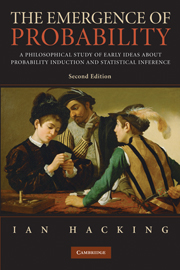 The Emergence of Probability
The Emergence of Probability Book contents
- Frontmatter
- Contents
- Introduction 2006
- 1 An absent family of ideas
- 2 Duality
- 3 Opinion
- 4 Evidence
- 5 Signs
- 6 The first calculations
- 7 The Roannez circle (1654)
- 8 The great decision (1658?)
- 9 The art of thinking (1662)
- 10 Probability and the law (1665)
- 11 Expectation (1657)
- 12 Political arithmetic (1662)
- 13 Annuities (1671)
- 14 Equipossibility (1678)
- 15 Inductive logic
- 16 The art of conjecturing (1692[?] published 1713)
- 17 The first limit theorem
- 18 Design
- 19 Induction (1737)
- Bibliography
- Index
- Frontmatter
- Contents
- Introduction 2006
- 1 An absent family of ideas
- 2 Duality
- 3 Opinion
- 4 Evidence
- 5 Signs
- 6 The first calculations
- 7 The Roannez circle (1654)
- 8 The great decision (1658?)
- 9 The art of thinking (1662)
- 10 Probability and the law (1665)
- 11 Expectation (1657)
- 12 Political arithmetic (1662)
- 13 Annuities (1671)
- 14 Equipossibility (1678)
- 15 Inductive logic
- 16 The art of conjecturing (1692[?] published 1713)
- 17 The first limit theorem
- 18 Design
- 19 Induction (1737)
- Bibliography
- Index
Summary
Probability began about 1660, but the word ‘probability’ is, in languages drawing on the Latin, a good deal older. The prehistory of probability can usefully begin with a study of earlier meanings of the very word. Its link with numerical ideas of randomness seems first to have occurred in print only in 1662. Some English philosophers, stimulated by an interest in ‘ordinary language’, and perhaps suspicious of three centuries of success in making probability mathematical, have recently emphasized some pre-1662 aspects of the word. They go so far as to say that even today the primary sense of the word is evaluative. Thus according to W. C. Kneale, ‘if we heard a man speak in ordinary life of the equal probability of various alternatives, we should understand him to mean that they are equally approvable as bases for action’ [1949, p. 169]. Or again: in the ‘common or garden’ usage of the word ‘probable’, ‘it is an evaluative term. To say that a proposition is probable is more like saying that it's right to do so and so’ [Körner, 1957, p. 19]. Stephen Toulmin [1950], John Lucas [1970] and others have subsequently expressed similar views.
Undoubtedly the Latin word probabilis did mean, among other things, something like ‘worthy of approbation’, but I very much doubt if Kneale's account of the present ‘common or garden’ usage is right. One way to question it is to note how odd is the sound of older bits of speech in which ‘probable’ really did mean approvable.
- Type
- Chapter
- Information
- The Emergence of ProbabilityA Philosophical Study of Early Ideas about Probability, Induction and Statistical Inference, pp. 18 - 30Publisher: Cambridge University PressPrint publication year: 2006
